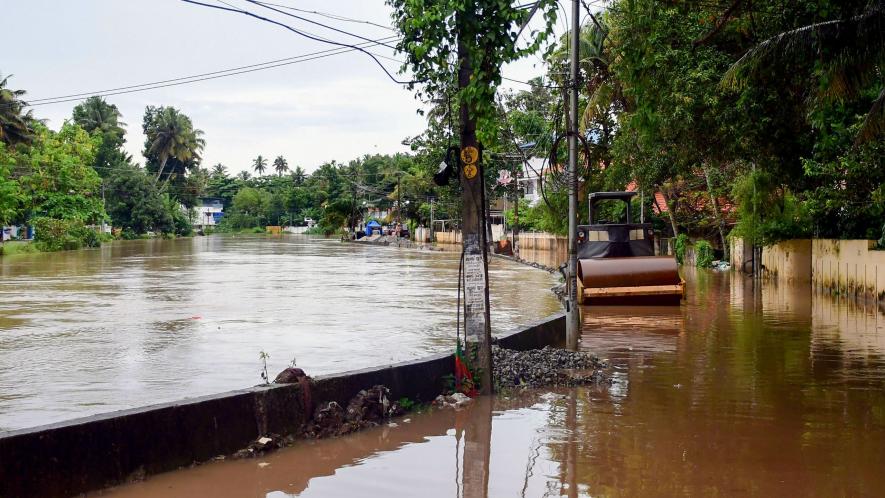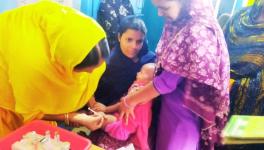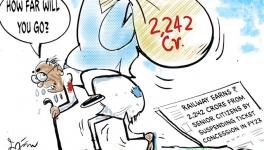Engaging Senior Citizens for Bengaluru Climate Action Plan

Amayizhanchan Canal overflows after incessant rains, in Thiruvananthapuram, Thursday, Nov. 23, 2023.Image Courtesy: PTI
The recent rains in early November were major news across all media, more so for the concerns of the World Cup Cricket match that was scheduled at the Chinnaswamy Cricket stadium in Bengaluru than for the safety and security of its citizens. Several city areas were inundated, leaving commuters stranded, homes gutted with rain and sewage waters, livelihoods on the streets of Bengaluru tossed and several helpless as they saw the rains ruin their homes, savings, belongings and more.
While everyone is affected to some extent by such rains, it is the senior citizens, particularly women, those with disabilities and dependent on others, those who have pre-existing health conditions, those with mental health challenges and those who are socially and economically weaker, those who live alone and those with no access to basic infrastructure are affected the most.
Urban Bengaluru is home to the highest number of senior citizens in the state among all the 30 districts, with a total number of over nine lakh senior citizens. What are the challenges faced by this population over the last couple of decades in the context of extreme weather conditions, and how is the city prepared to protect this population? These are questions that remain to be addressed. Once referred to as a pensioner’s paradise, Bengaluru today is a nightmare for the senior citizens with poor infrastructure for mobility, access to health care, access to clean drinking water, safe food, safe places for recreation and general well-being. For many, the only hope has remained the ever-increasing number of homes for the aged across the city and the helpline number 1090.
There are many international agreements and legal provisions that provide rights to the aged. The UN Principles of Ageing, established in 1982, embodies the Rights of Senior Citizens, which are the foundation for the entitlements of senior citizens. It has five principles (United Nations Department of Economic and Social Affairs, n.d.), and these are Independence, Participation, Care, Self-fulfilment and Dignity. The 2030 Agenda for Sustainable Development sets out a universal plan of action to achieve sustainable development in a balanced manner. It calls for ensuring that the Sustainable Development Goals (SDGs) are met for all segments of society, at all ages, with a particular focus on the most vulnerable—including older persons. More importantly, Article 41 of the Indian constitution (under the category of Directive Principles of State Policy) states that “the State shall also, within the limits of its economic capacity and development, make effective provision for securing the right to work, to education and to public assistance in cases of unemployment, old age, sickness and disablement and in other cases of undeserved want”.
Further, the legal right to claim maintenance by senior citizens is given under personal laws, the Code of Criminal Procedure and the more recent Maintenance and Welfare of Parents and Senior Citizens Act, 2007, which aims at providing maintenance to senior citizens in order to prevent their destitution. It additionally seeks to protect the life and property of the senior citizens.
With extremes of weather becoming common globally, Bengaluru city has been experiencing unprecedented rains followed by floods, really hot summers and chilly winters. Many senior citizens lack the physical, mental, social and financial resources to avoid or minimise the consequences of such extreme weather.
Increased summer temperatures with heat waves and the urban heat island effect can be life-threatening because of the reduced physiological ability of the body to regulate temperature. This can be worse when they have pre-existing conditions of hypertension, diabetes, cardiovascular and respiratory disease and dehydration. And the risk gets amplified when they do not have the resources to ease their living conditions. Access to 24x7 energy, clean drinking water, healthy food and ease of transportation and health care becomes crucial. Heavy rains and flooding can also cause injuries and be life-threatening to senior citizens. Many will not be able to flee or be easily evacuated and become susceptible to water-borne diseases such as diarrhoea, malaria, dengue and other diseases that spread quickly in flooded neighbourhoods. With the increasing Air Quality Index (AQI) across the city, senior citizens are less likely to be informed about it because of poor access to phones and other digital communication technologies. This can leave them unaware and prone to the health impacts of air pollution in many parts of the city. Such extremes of weather and their impacts are also more likely to leave senior citizens, particularly those living at the margins, with significant financial losses as they struggle to recover with limited incomes.
The COVID-19 pandemic left many lessons to learn, with the elderly being affected not just by the burden of the disease but also by lack of access to food, health care, medicines and more. The threat from climate change to the rights of senior citizens is grave, and with older people being neglected, ignored, excluded and left behind, it only gets worse. Research in this context is greatly needed paying attention to those at the intersection of gender, sexuality, religion, caste, class, language, region, and their coping mechanisms with the impacts of climate change will reveal deeper insights to make our cities truly inclusive.
In all aspects of urban design and development, decision-makers have largely left behind the elderly as being conservative, old-fashioned, withdrawn, incapable, with no social networks, and so on. Particularly in the context of climate change, it is now essential for their voices to be heard. They surely have a lot to contribute to addressing this issue locally. Every ward in the city could first start by creating awareness of climate change among senior citizens. This could be followed by holding consultations with them, as the city has a growing number of retired persons who are knowledgeable and have years of experience that can be extremely valuable in tackling climate change-related impacts at the local level. Their memories of extreme weather events and perhaps natural disasters will provide valuable insights to prepare mitigation and adaptation plans for the local level. They also form a significant percentage of the voting population and can certainly influence policy decisions.
With an increased number of engagements with senior citizens through diverse forms of dialogue and discussion, the city can have an inclusive plan built on the ground up that accounts for the concerns and well-being of all groups, particularly the elderly. Door-to-door surveys, focus group discussions, online questionnaires, personal interviews, phone interviews, and interactive discussions in every ward will help obtain some of the best ideas for all the local level challenges, and this will help design the most appropriate plan for every ward across the city. One has to also bear in mind that not everyone is comfortable with technology and digital tools. And a one-size-fits-all, top-down strategy is unlikely to reach the most vulnerable.
It is pivotal now to plan the city with senior citizens in mind in the context of climate change. The population is ageing, and soon, the city will be home to many senior citizens. This highlights the importance of having a plan in place and the preparedness to deal with extreme weather events and to tap into the knowledge and experience of today’s senior citizens.
(Bhargavi S Rao is a Senior Fellow and Trustee at the Environment Support Group. Views expressed are personal.)
Get the latest reports & analysis with people's perspective on Protests, movements & deep analytical videos, discussions of the current affairs in your Telegram app. Subscribe to NewsClick's Telegram channel & get Real-Time updates on stories, as they get published on our website.
























